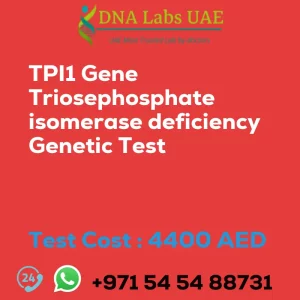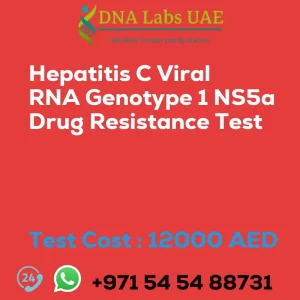SFTPD Gene Surfactant Metabolism Dysfunction Genetic Test
Welcome to the DNA Labs UAE blog! Today, we will be discussing the SFTPD gene surfactant metabolism dysfunction genetic test. This test is designed to analyze the DNA sequence of an individual’s genes and identify mutations in the SFTPD gene that may be causing surfactant metabolism dysfunction.
Test Components and Price
The SFTPD gene surfactant metabolism dysfunction genetic test is priced at 4400.0 AED. The test requires a blood sample, extracted DNA, or one drop of blood on an FTA card.
Report Delivery and Method
After the sample is collected, the report will be delivered within 3 to 4 weeks. The test utilizes NGS (Next-Generation Sequencing) technology, which allows for the detection of genetic variations and mutations associated with certain diseases or conditions.
Test Type and Doctor
The SFTPD gene surfactant metabolism dysfunction genetic test falls under the category of metabolic disorders. It is recommended to consult with a general physician who specializes in genetics for this test.
Test Department and Pre Test Information
The SFTPD gene surfactant metabolism dysfunction genetic test is conducted in the Genetics department. Prior to the test, it is important to provide the clinical history of the patient who is undergoing the test. Additionally, a genetic counseling session will be conducted to draw a pedigree chart of family members affected with surfactant metabolism dysfunction.
About Surfactant Metabolism Dysfunction
The SFTPD gene plays a crucial role in surfactant metabolism dysfunction. Surfactant is a substance that lines the lungs and facilitates the exchange of oxygen and carbon dioxide. Mutations in the SFTPD gene can disrupt surfactant metabolism, leading to respiratory distress and lung diseases such as interstitial lung disease and pulmonary fibrosis.
The Importance of NGS Genetic Testing
NGS genetic testing enables healthcare professionals to identify mutations in the SFTPD gene that may be responsible for surfactant metabolism dysfunction. By understanding the underlying cause, appropriate treatment plans can be developed to improve patient outcomes. This testing method also has the potential to prevent or manage associated lung diseases.
Thank you for reading our blog post on the SFTPD gene surfactant metabolism dysfunction genetic test. If you have any further questions or would like to schedule a test, please contact DNA Labs UAE.
| Test Name | SFTPD Gene Surfactant metabolism dysfunction Genetic Test |
|---|---|
| Components | |
| Price | 4400.0 AED |
| Sample Condition | Blood or Extracted DNA or One drop Blood on FTA Card |
| Report Delivery | 3 to 4 Weeks |
| Method | NGS Technology |
| Test type | Metabolic Disorders |
| Doctor | General Physician |
| Test Department: | Genetics |
| Pre Test Information | Clinical History of Patient who is going for SFTPD Gene Surfactant metabolism dysfunction NGS Genetic DNA Test A Genetic Counselling session to draw a pedigree chart of family members affected with Surfactant metabolism dysfunction |
| Test Details |
The SFTPD gene is involved in surfactant metabolism dysfunction. Surfactant is a substance that lines the lungs and helps with the exchange of oxygen and carbon dioxide. Mutations in the SFTPD gene can lead to a dysfunction in surfactant metabolism, resulting in respiratory distress and lung diseases such as interstitial lung disease and pulmonary fibrosis. NGS (Next-Generation Sequencing) genetic testing is a method used to analyze the DNA sequence of an individual’s genes. It allows for the detection of genetic variations, including mutations, that may be associated with certain diseases or conditions. In the case of surfactant metabolism dysfunction, NGS genetic testing can be used to identify mutations in the SFTPD gene that may be causing the dysfunction. By identifying these mutations, healthcare professionals can better understand the underlying cause of the surfactant metabolism dysfunction and develop appropriate treatment plans. This can help improve patient outcomes and potentially prevent or manage the associated lung diseases. |








